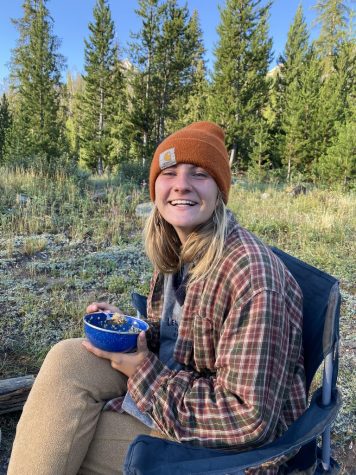Mental Musings: Love Languages
Graphic by Hannah Agpoon.
February 14, 2022
By Millie Peck
peckcami@grinnell.edu
I’ve never been big into astrology or enneagram or any of those binary personality tests. I used to roll my eyes when people asked what my love language was. But communication has recently been a big topic for me in therapy, and I am starting to realize that the ways we communicate, express and receive love –– also known as love languages –– are vital to secure relationships. And, at least for me, secure relationships are essential to maintaining my mental health.
In the common vernacular, there are five love languages: words of affirmation, quality time, gift giving, acts of service and physical touch. Again, if you are rolling your eyes right now, I was too when I first saw this list. It seemed silly to me that people would pick one mode to give and receive affection. Honestly, I still don’t think that people only have only one love language. But I do think that any close relationship, whether it be romantic, parental, or a friendship, will probably draw from different aspects of each of these categories. So perhaps the way that we like to receive love might be a little different from the way that we give it.
The 2021 fall semester marked a turning point in my mental health journey. I wasn’t self-harming or engaging in eating disorder behaviors. I wasn’t having anxiety attacks, and I wasn’t depressed. For the first time since I was 13, I felt like somewhat … normal? Sure, I was still stressed about school and day-to-day anxieties, but it was no longer all-consuming.
I owe this upturn in my mental health to a lot of factors, one being my stent at inpatient therapy (although that’s a topic for another time), but I also know that a huge component is that I feel socially secure for the first time in my life. I found a group of people who made me feel supported and seen. They are people who I can dance with at parties, but also who call when I’m feeling anxious and call me when they are feeling depressed. They’re real friends who care about me in a genuine way. But it wasn’t just the actual people around me that changed, it was how I was actively participating in those relationships.
Previously, every little thing that a friend did would fuel my anxiety. My brain would tell me it was proof that they didn’t really like me. That they didn’t care. That I wasn’t good enough. It was the same anxiety loop day after day. But now I am learning to focus on when the people in my life show that they do care about me, rather than noticing what they don’t do.
In the past, I had only ever thought about the way that I expressed love, and more importantly, the way I wanted to receive it. And if people failed to express their love for me in the ways that I imagined were important, I took it personally; I thought I didn’t mean enough to them. This only worsened my feelings of depression, anxiety and loneliness. So, what I have been working on is reframing.
One of my best friends is known for being a little all over the place. Last year I might have thought that when you care about someone you show up on time, you don’t cancel. When she does this, it must mean that I’m not important to her (perhaps slightly irrational, but hey that’s what anxiety does). But now I realize that it has nothing to do with me. In fact, I myself run late all the time. Her lack of promptness likely has nothing to do with me. Instead, her love language shines in different ways: texting me to tell me how amazing her day was or telling me she missed me even when it’s only been a day. I also think about when we run together or how every time we bump into each other she hugs me. We all express our love differently.
But even if her occasional tardiness really did bother me, it would still be okay to tell her. It’s okay to ask people for what we need, to tell them our love language. For example, before Valentine’s Day my boyfriend and I discussed what was important to us and both decided that instead of getting each other gifts, we would write each other letters and take some time to spend time alone together. In the past I became upset when boyfriends didn’t properly acknowledge an event like Valentine’s Day or an anniversary, but I also didn’t communicate to them what I wanted.
There is nothing shameful about expressing how we want to receive love, as long as we also recognize all the ways that different people choose to offer us love themselves.



















































